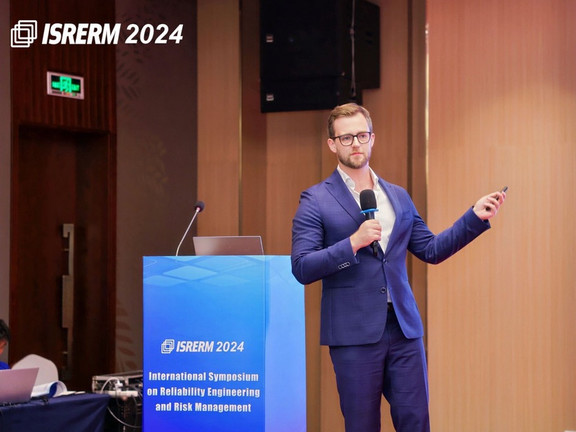Prof. Dr. Matthias Faes delivers a plenary lecture at ISRERM 2024

The 9th Conference on Reliability Engineering and Risk Management (ISRERM 2024) was hosted by Hefei University of Technology. The event took place from October 18th to October 21st in China. Prof. Dr. Matthias Faes from the Chair for Reliability Engineering represented the Chair and delivered a plenary keynote lecture.
ISRERM is a distinguished biennial international conference with a well-established history, bringing together leading experts in reliability engineering and risk management. The thematic focus encompasses reliability-based and risk-informed decision-making, addressing safety considerations throughout the lifecycle of engineering systems. The conference serves as a premier platform for fostering interdisciplinary collaboration and advancing innovative solutions in the domains of risk and reliability.
Prof. Dr. Matthias Faes’ plenary lecture, titled "Efficient Numerical Methods to Deal with Imprecise Probabilities" addressed the challenge of reconciling numerical predictions with actual physical behavior in structural design. Despite the widespread use of numerical tools to simulate and optimize designs prior to prototype construction, discrepancies often arise due to uncertainties in model physics and governing parameters. These uncertainties are particularly prevalent in structural dynamics, where loads such as wind, earthquakes, or waves are inherently uncertain and time-dependent. Prof. Dr. Faes highlighted the limitations of traditional probabilistic models in capturing these uncertainties, particularly when confronted with epistemic uncertainty—where available data is incomplete or conflicting.
In his presentation, Prof. Dr. Faes proposed advanced methods for modeling imprecise stochastic processes that accommodate missing or conflicting data. He outlined efficient strategies for propagating these imprecise models through numerical simulations, ensuring more reliable predictions. These techniques provide a robust alternative to conventional probabilistic approaches, enhancing the accuracy of structural assessments under uncertain and dynamic conditions.
By combining rigorous theoretical frameworks with practical applications, Prof. Dr. Faes highlighted the significant potential of these methods to enhance the reliability and precision of structural simulations under conditions of uncertainty.
Photo credit: ISRERM 2024
Conference details sourced from https://isrerm2024.aconf.org/








